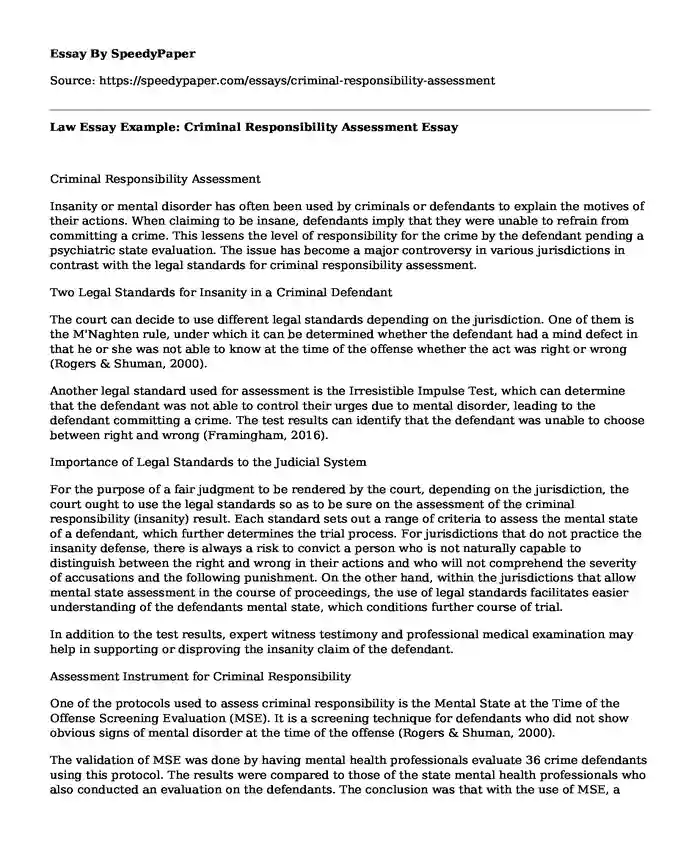
| Type of paper: | Essay |
| Categories: | Psychology Law Criminal law |
| Pages: | 3 |
| Wordcount: | 649 words |
Criminal Responsibility Assessment
Insanity or mental disorder has often been used by criminals or defendants to explain the motives of their actions. When claiming to be insane, defendants imply that they were unable to refrain from committing a crime. This lessens the level of responsibility for the crime by the defendant pending a psychiatric state evaluation. The issue has become a major controversy in various jurisdictions in contrast with the legal standards for criminal responsibility assessment.
Two Legal Standards for Insanity in a Criminal Defendant
The court can decide to use different legal standards depending on the jurisdiction. One of them is the M'Naghten rule, under which it can be determined whether the defendant had a mind defect in that he or she was not able to know at the time of the offense whether the act was right or wrong (Rogers & Shuman, 2000).
Another legal standard used for assessment is the Irresistible Impulse Test, which can determine that the defendant was not able to control their urges due to mental disorder, leading to the defendant committing a crime. The test results can identify that the defendant was unable to choose between right and wrong (Framingham, 2016).
Importance of Legal Standards to the Judicial System
For the purpose of a fair judgment to be rendered by the court, depending on the jurisdiction, the court ought to use the legal standards so as to be sure on the assessment of the criminal responsibility (insanity) result. Each standard sets out a range of criteria to assess the mental state of a defendant, which further determines the trial process. For jurisdictions that do not practice the insanity defense, there is always a risk to convict a person who is not naturally capable to distinguish between the right and wrong in their actions and who will not comprehend the severity of accusations and the following punishment. On the other hand, within the jurisdictions that allow mental state assessment in the course of proceedings, the use of legal standards facilitates easier understanding of the defendants mental state, which conditions further course of trial.
In addition to the test results, expert witness testimony and professional medical examination may help in supporting or disproving the insanity claim of the defendant.
Assessment Instrument for Criminal Responsibility
One of the protocols used to assess criminal responsibility is the Mental State at the Time of the Offense Screening Evaluation (MSE). It is a screening technique for defendants who did not show obvious signs of mental disorder at the time of the offense (Rogers & Shuman, 2000).
The validation of MSE was done by having mental health professionals evaluate 36 crime defendants using this protocol. The results were compared to those of the state mental health professionals who also conducted an evaluation on the defendants. The conclusion was that with the use of MSE, a large number of defendants were screened without a prejudice to those who had a proper legal defense (Slobogin, Meltont, & Showalter, 1984).
Difference between a Legal Standard for Insanity and a Psychological Assessment Instrument
A legal standard for insanity is defined as a legal test to determine whether a defendant was insane at the time of the offense (Thomson, 2016).
A physiological assessment instrument, on the other hand, is used for a more comprehensive assessment of the individuals behavior and capabilities to arrive at a conclusion (Framingham, 2016).
References
Framingham, J. (2016). What is Psychological Assessment? Psych Central. Retrieved from https://psychcentral.com/lib/what-is-psychological-assessment
Rogers. R, Shuman D. (2000). The mental state at the time of the offense measure: its validation and admissibility under Daubert. Journal of the American Academy of Psychiatry and the Law 28(1):23-8; discussion 29-32
Slobogin.S., Meltont, G, & Showalter, R. (1984). The feasibility of a brief evaluation of mental state at the time of the offense. Law and Human Behavior 8(1). pp. 305-320.
Thomson .R. (2016). The 'Model Penal Code' Test for Legal Insanity. Find Law. Retrieved from http://criminal.findlaw.com/criminal-procedure/the-model-penal-code-test-for-legal-insanity.html
Cite this page
Law Essay Example: Criminal Responsibility Assessment. (2017, Jul 23). Retrieved from https://speedypaper.net/essays/criminal-responsibility-assessment
Request Removal
If you are the original author of this essay and no longer wish to have it published on the SpeedyPaper website, please click below to request its removal:
- Essay Sample: A Comparison of Repression Between Jennifer Freyd and Sigmund Freud
- The United States Is Not Really a Democracy - Essay Example
- Free Essay Comprising the Full Script Analysis of Cloud 9 by Carl Churchill
- Forever Young - Free Essay about Aging
- Free Essay Research on the Cultural Health of New Hannover County in North Carolina
- Essay Sample on History of the Business Industry
- Free Essay Example on Corruption in Somalia
Popular categories




